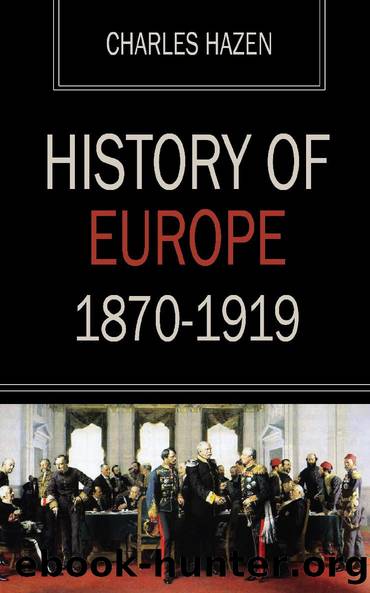History of Europe 1870-1919 by Charles Hazen

Author:Charles Hazen
Language: eng
Format: epub
Publisher: Pronoun
CHAPTER X. THE SMALL STATES OF EUROPE
THERE WERE IN EUROPE in 1914 about twenty different states. It is difficult to give the precise number, since the exact status of one or two of them was somewhat doubtful. Some of these states were extremely small. There were two petty republics; one, Andorra, located in the Pyrenees, which consisted chiefly of a valley surrounded by high mountain peaks and which had a population of about five thousand. Its maximum length is seventeen miles, its width eighteen. Andorra is under the suzerainty of France and of the Spanish Bishop of Urgel, paying 960 francs a year to the former, 460 to the latter. The other of these republics is San Marino, which claims to be the oldest state in Europe, and is located on a spur of the Apennines, entirely surrounded by Italy, and which has a population of about twelve thousand. San Marino is the sole survivor of those numerous city-republics which abounded in Italy during the Middle Ages. Then there is also the little principality of Liechtenstein, lying between Switzerland and Austria, and having a population of about eleven thousand. There was also in 1914 the principality of Albania, a state which was created by international action in 1912 and 1913, and which collapsed in the following year at the outbreak of the war. But whatever the exact status of these petty states may be, they may be ignored in our survey, as, with the exception of Albania, they have not counted in the general politics of Europe.
There were in 1914 three other states which occupied a peculiar position. They were the so-called neutralized states Belgium, Luxemburg, and Switzerland. A neutralized state is one whose independence and integrity are guaranteed forever by international agreement. Such states may generally maintain armies, but only for defense. They may never make aggressive war; nor may they make treaties or alliances with other states that may lead them into war. The reason why a state may desire to become neutralized is that it is weak, that its independence is guaranteed, that it has no desire or ability to participate in international affairs, in the usual struggles or competitions of states. The reasons why the great powers have consented to the neutralization of such states have differed in different cases. But the chief reason has been connected with the theory of the balance of power, the desire to keep them as buffers between two or more neighboring large states. Switzerland was neutralized in 1815 at the close of the Napoleonic Wars, and its neutrality has never been infringed. Belgium was neutralized in 1831when it separated from Holland and became an independent state. Luxemburg was neutralized in 1867when it was freed from its previously existing connections with Germany, as a result of the reorganization of Germany and the establishment of the North German Confederation, after the Austro-Prussian War of 1866 and the famous battle of Königgrätz or Sadowa.
A neutralized state may, as has been said, have an
Download
This site does not store any files on its server. We only index and link to content provided by other sites. Please contact the content providers to delete copyright contents if any and email us, we'll remove relevant links or contents immediately.
| Africa | Americas |
| Arctic & Antarctica | Asia |
| Australia & Oceania | Europe |
| Middle East | Russia |
| United States | World |
| Ancient Civilizations | Military |
| Historical Study & Educational Resources |
Cecilia; Or, Memoirs of an Heiress — Volume 1 by Fanny Burney(32536)
Cecilia; Or, Memoirs of an Heiress — Volume 2 by Fanny Burney(31933)
Cecilia; Or, Memoirs of an Heiress — Volume 3 by Fanny Burney(31925)
The Secret History by Donna Tartt(19017)
Sapiens: A Brief History of Humankind by Yuval Noah Harari(14356)
Leonardo da Vinci by Walter Isaacson(13303)
The Radium Girls by Kate Moore(12011)
Sapiens by Yuval Noah Harari(5358)
How Democracies Die by Steven Levitsky & Daniel Ziblatt(5207)
The Wind in My Hair by Masih Alinejad(5085)
Homo Deus: A Brief History of Tomorrow by Yuval Noah Harari(4894)
Endurance: Shackleton's Incredible Voyage by Alfred Lansing(4749)
Man's Search for Meaning by Viktor Frankl(4565)
The Silk Roads by Peter Frankopan(4520)
Millionaire: The Philanderer, Gambler, and Duelist Who Invented Modern Finance by Janet Gleeson(4457)
The Rape of Nanking by Iris Chang(4194)
Joan of Arc by Mary Gordon(4090)
The Motorcycle Diaries by Ernesto Che Guevara(4080)
Stalin by Stephen Kotkin(3949)
